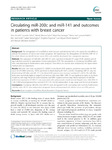Circulating miR-200c and miR-141 and outcomes in patients with breast cancer

Ver/
Use este enlace para citar
http://hdl.handle.net/2183/17568Coleccións
- GI-FENM - Artigos [109]
- INIBIC-OCT - Artigos [21]
Metadatos
Mostrar o rexistro completo do ítemTítulo
Circulating miR-200c and miR-141 and outcomes in patients with breast cancerAutor(es)
Data
2015Cita bibliográfica
Antolín S, Calvo L, Blanco-Calvo M, et al. Circulating miR-200c and miR-141 and outcomes in patients with breast cancer. BMC Cancer [Internet]. 2015 Abr 2 [acceso 2016 Nov 16];15(297):[12] p.
Resumo
[Abstract]
Background. The deregulation of microRNAs in both tumours and blood has led to the search for microRNAs to indicate the presence of cancer and predict prognosis. We hypothesize the deregulation of miR-200c/miR-141 in the whole blood can identify breast cancer (BC), and could be developed into a prognostic signature.
Methods. The expression of miR-200c and miR-141 were examined in bloods (57 stage I-IV BC patients and 20 age-matched controls) by quantitative reverse-transcription PCR. The associations of circulating microRNAs with clinic and pathological characteristics were analysed. Their effects on survival were analysed by the Kaplan-Meier method and Cox regressions.
Results. MiR-200c was down regulated (P < 0.0001) in the blood of BC patients, yielded an area under the ROC curve of 0.79 (90% sensitivity, 70.2% specificity) in discriminating BC from controls. Circulating miR-141 was not discriminating. MiR-200c and miR-141 in the blood of BC patients were inversely correlated (P = 0.019). The miR-200c levels were numerically higher in stage IV and tumours with lower MIB-1. MiR-141 was significantly higher in the blood of patients with stage I-III, lymph node metastasis, and HER2 negative tumours. High blood expression of miR-200c and/or low expression of miR-141 was associated with unfavourable overall survival (hazard ratio, 3.89; [95% CI: 1.28-11.85]) and progression-free survival (3.79 [1.41–10.16]) independent of age, stage and hormonal receptors.
Conclusions. Circulating miR-200c and miR-141 were deregulated in BC comparing with controls. Furthermore, miR-200c and miR-141 were independent prognostic factors and associated with distinct outcomes of BC patients.
Palabras chave
Breast neoplasms
MicroRNAs
Blood
Biomarker
Prognostic factors
MicroRNAs
Blood
Biomarker
Prognostic factors
Descrición
Research article
Versión do editor
Dereitos
Atribución 3.0 España
ISSN
1471-2407






